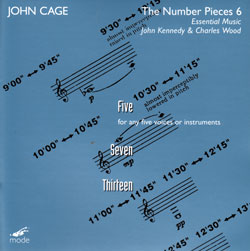
There has been an enormous surge in the recordings of Cage's number pieces, works composed in the last few years of his life. It's almost as though it's taken 10-15 years to come to grips with them, especially with regard to ensembles/musicians of a more "classical" bent; to those versed in post-Cage improvisation, they may be more natural vehicles for expression.
Here, the Essential Music ensemble tackles three works. "Five" is, appropriately, engaged by a quintet eliciting sounds from blown bottles for precisely five minutes. Originally written for wind quintet, Cage was at first reluctant to give his okay to the bottles but soon relented and, indeed, the realization here is very lovely, sequences of soft tones as irregular and true as a series of breezes in a field. Inevitably, one recalls shakuhachi playing, but this performance is more grounded in contemporary Western sonorities even, at one point, seeming to nod toward the minimalism of Riley, et. al.
"Seven" is given a 20-minute performance with flute, clarinet, violin, viola, cello, piano and percussion. The score is very much concerned with subtle pitch shifts and that is surely the salient feature here, with long-held notes, punctuated now and then by spare piano chords, weaving amongst each other. There's a certain dryness here, one that affects many an academic ensemble, a kind of reticence to dig somewhat deeper than normal into the music, which gives something of a concert hall sheen to the piece. It's played with great exactitude and care but one almost thinks perhaps too much. Cage's work can well withstand some juice and joy.
"Thirteen" was the last piece completed by Cage before his death and apparently has no score as such, just time brackets (as do all the number pieces) and the instructions for long tones to be played quietly while the dynamics of the shorter ones are left to the discretion of the performer, but with strong consideration to what's occurring around him or her and how the contribution will effect the gestalt. A classic anarchist piece, then. There's an added richness provided by the instrumentation brought into play by the thirteen musicians (who opt for a 30-minute performance time) that goes a long way toward leavening the aridity of the prior interpretation. Still, the "language" employed is often replete with new music tropes, the kind of inflections and accents all too commonly heard in post-serial music, ones that carry the musty odor of the European (and US) music schools and nothing of the rest of the world, the sort of thing that Cage was so open to. It's a fairly somber reading, again performed with precision and even a smattering of humor on occasion; perfectly fine though one can't help shake the feeling that there's more to be found, a greater expansiveness, more air.
Comments and Feedback:



More Recent Reviews, Articles, and Interviews @ The Squid's Ear...


|

